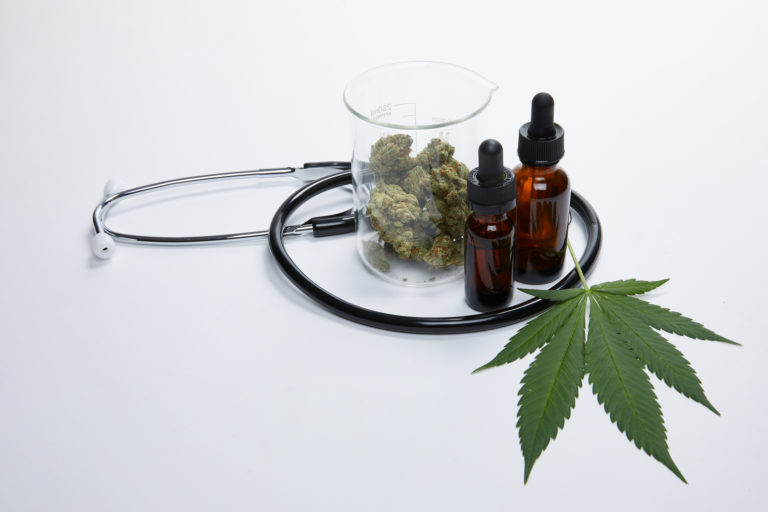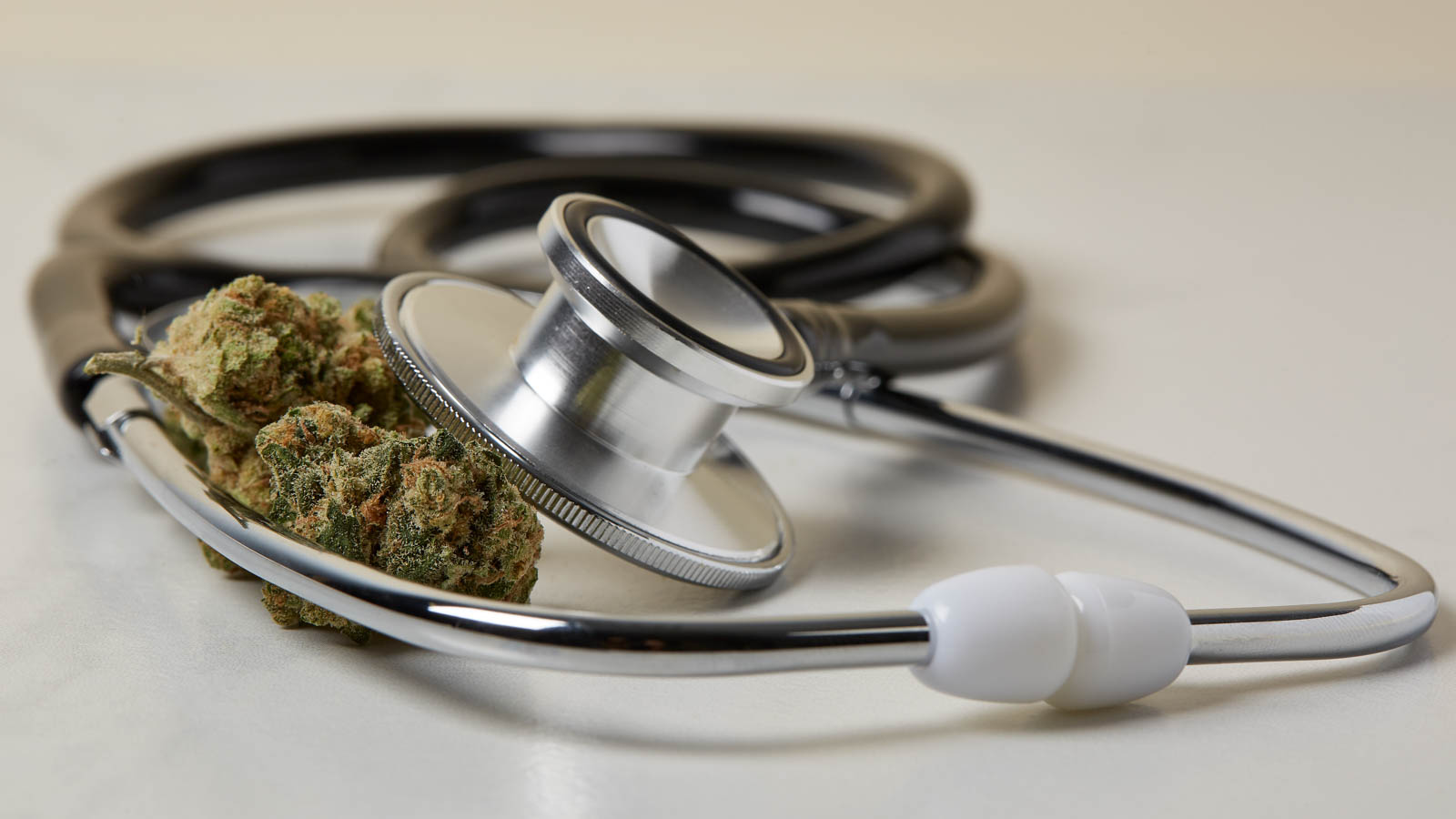Since smoking a joint can lead to a relaxing high, you might wonder about cannabis use and its effect on blood pressure. We know that weed can make your eyes red, but does it also raise or lower blood pressure, or does it not have any effect at all? If you have high blood pressure, is marijuana safe to consume?
Here we'll address how smoking weed, including medical marijuana, could factor into your blood pressure levels.
Does marijuana lower or raise blood pressure?
To answer this question, we should focus on two of the primary cannabinoids present in cannabis: cannabidiol (CBD) and tetrahydrocannabinol (THC). Both may exert an influence on blood pressure levels.
Dr. Bonni Goldstein, a medical adviser to Weedmaps and the director of Canna-Centers in Lawndale, California, outlined the potential effects of THC on blood pressure:
“THC can affect blood pressure depending on the dose, the route of administration, a person's experience with THC, and a person's underlying health. Healthy volunteers that took THC had an increase in heart rate and decrease in blood pressure. In studies where people used THC while lying down, they had elevated blood pressure. When they stood up, their blood pressure dropped and they experienced low blood pressure.”
These sudden drops in blood pressure, also known as white outs or green outs, may indeed be linked to cannabis use. Dr. Melanie Bone, a board-certified OB-GYN and cannabis specialist who practices in West Palm Beach, Florida, told Weedmaps that "cannabis may cause a drop in blood pressure on standing — known as postural hypotension." This type of drop in blood pressure is not desirable, as it can cause vertigo and even fainting. So, when we talk about "lowering blood pressure," we do not necessarily consider that effect beneficial to health.
 Photo by: Gina Coleman/Weedmaps
Photo by: Gina Coleman/WeedmapsImage lightbox

And how does CBD affect blood pressure? The consensus is that CBD tends to relax the blood vessels and decrease anxiety, which ultimately leads to a lowering of blood pressure. This type of blood pressure reduction is more favorable, as it is associated with decreased levels of anxiety. Both THC and CBD may lower blood pressure in different ways. However, based on available research, neither CBD nor THC should be considered a medical treatment for high blood pressure.
What are the cardiovascular effects of cannabis?
Another frequently asked question about cannabis and cardiovascular health is: can weed cause a heart attack?
First, let's again distinguish between the cannabinoids THC and CBD. For example, CBD oils containing trace levels of THC may have very different effects than smoking a high-THC strain of marijuana. Various studies have indicated that THC may have detrimental effects on cardiovascular health, whereas CBD could be helpful to the heart.
Goldstein added, "CBD does not appear to have the same risks for the heart as THC and in fact, appears to be somewhat cardioprotective." To support this assertion, Goldstein cited a 2010 study published in the Journal of the American College of Cardiology in which researchers concluded that CBD has therapeutic potential in treating complications of diabetes, as well as some cardiovascular disorders. Most notably, CBD could reduce inflammation, a condition that can ultimately damage the blood vessels, arteries, and vital organs. So, if you apply CBD oil to your skin or swallow a few tablespoons, the impact could differ greatly than if you smoked a blunt.
To this point, there is some research that suggests smoking THC could directly or indirectly lead to a heart attack. One 2019 study titled "The Cardiovascular Effects of Marijuana: Are the Potential Adverse Effects Worth the High?" and published in the Journal of the Missouri State Medical Association showed that some people experienced a heart attack within an hour of smoking cannabis.
Bone, however, argued, "On careful study, many of the patients also smoked cigarettes and were obese, making it hard to draw absolute conclusions. Also, the observations were made on cannabis of unknown origin, not cannabis from a dispensary." The fact that the cannabis did not come from a registered dispensary is significant, as there is no available lab testing to determine what other compounds may have been present.
The bottom line is that there have been studies demonstrating a questionable association between smoking weed and having a heart attack, and more research is necessary.
Weed and blood pressure medication
You might also be wondering, what if you're smoking weed while taking blood pressure medication? Will there be an adverse reaction? If you are smoking THC-rich cannabis and taking medication for high blood pressure, the answer is that there could be.
Goldstein explained, "Smoking cannabis can be harmful for those with heart disease or hypertension since the smoke contains carbon monoxide. This gas binds to the hemoglobin in red blood cells, displacing oxygen off of the red blood cells which results in less oxygen going to the body's tissues, including the heart. People with heart disease or high blood pressure should avoid smoking."
Instead, Goldstein recommends other methods of cannabis use, such as sublingual tinctures or edibles, which she says are safe to use if someone is on blood pressure medication. Further, Bone stressed that people who use cannabis and are on blood pressure medications need to be mindful of the possibility of an interaction with other prescription medications. This means monitoring blood pressure and reporting any dizziness to your doctor, who can adjust your dosages accordingly.
 Photo by: Gina Coleman/Weedmaps
Photo by: Gina Coleman/WeedmapsImage lightbox

In particular, the blood thinner warfarin was shown in a 2017 study published in the journal Epilepsy & Behavior Case Reports to interact with cannabidiol (CBD) in certain epileptic individuals. In line with Bone's advice, researchers concluded that patient lab work should be monitored closely.
While it is possible for warfarin and other medications to interact with cannabis, there are no guarantees, and the 2017 study focused on patients with epilepsy rather than on the general population. As Dr. Bone reported, “In my private practice, I have not encountered a significant negative interaction between blood pressure medication and cannabis.”
Other effects of weed on blood pressure
There may be other effects of marijuana on blood pressure that health practitioners have yet to discover. All potential effects depend on the individual's existing health problems, especially co-morbid conditions such as diabetes and obesity.
Can people without these conditions safely indulge in marijuana? A healthy individual's body may appear as a well-oiled machine, but Bone disputes that analogy, pointing out that, "Unlike a car, where we replace the brakes or tires, the heart never gets a vacation and the blood vessels need to keep working forever. And the nervous system, which directs the show like a conductor, is on duty 24/7."
Moderation, then, may be key in integrating a cannabis regimen into your healthcare plan. Consult with your physician before you begin using cannabis or CBD products and discuss any medications you are currently taking.

